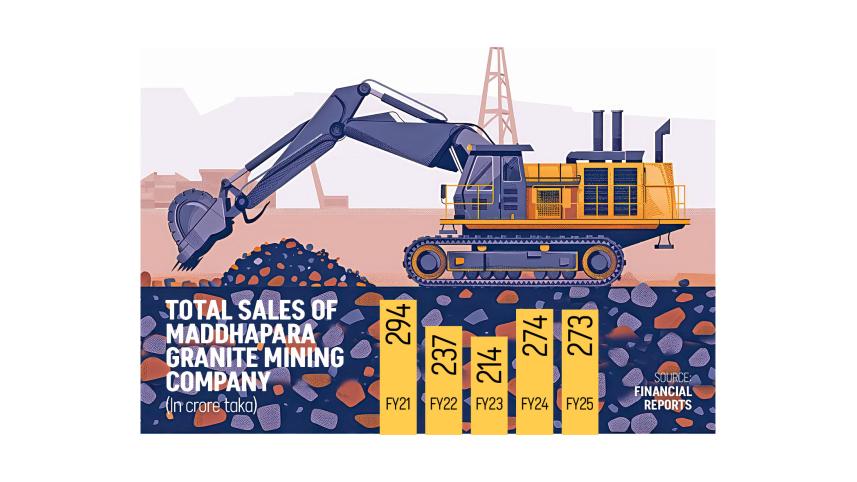Maddhapara stone extraction could stall for space shortage

State-run Maddhapara Granite Mining Company Limited might soon be forced to halt extractions as it is running out of storage space, apparently due to slow government purchases.
Around 12 lakh tonnes of stone, worth around Tk 350 crore, are now piled up in the company's storage yard in Dinajpur, around 300 kilometres north of the capital Dhaka.
Meanwhile, the company has sought government funds, saying it had Tk 20 crore at hand but had to pay contractor Germania Trest Consortium's (GTC) quarrying bill of Tk 60 crore for the June-August period.
Late fees are applicable if payments are not made within 28 days of a bill's submission.
Under a 2021 agreement, the GTC has extracted around 47 lakh tonnes of granite to date.
The company said it signed two agreements with Bangladesh Railway last February and June for the sale of around 140,000 tonnes of railway ballast for repairs and maintenance.
Railway ballast is the layer of crushed rocks or coarse aggregates that forms the foundation of a railway track, providing crucial support for the sleepers, drainage for water, and stability to prevent the track from shifting.
However, Bangladesh Railway purchased only 64,000 tonnes.
Farid Ahmed, general manager (West) of Bangladesh Railway, said he knew about the stone pile-up.
Demand is met with budgetary allocations, which were inadequate for development works, leading to a slowdown in purchases, he said.
"Already, we have sent a letter seeking budget. Once we get the budget, we will buy stones for the railway roads," he said, adding that it was currently making purchases within the existing limit.
The Bangladesh Water Development Board has also cut down on its purchase of boulders from Maddhapara, which are said to be more sustainable and commercially viable for river training than traditional blocks.
Around 3.20 lakh tonnes of boulders are currently in the storage yard.
Md Enayet Ullah, director general of the board, did not receive phone calls.
The quality of the granite has been certified by the Bangladesh University of Engineering and Technology, Bangladesh Road Research Laboratory, and Local Government Engineering Department (LGED), said DM Zobayed Hossain, managing director of the granite company.
They are better than imported ones, which are often of lower quality and higher cost. The local small-sized stones are fit for road construction while stone dust is suitable for dense carpeting of roads, he said.
So, the government could promote the use of these stones and stone dust, which will help the company make sales. The LGED has a huge demand for stone dust, yet it is using imports for road construction, he added.
The granite company has repeatedly written to the LGED urging the use of domestic dust in its projects, he said.
Instead, many LGED contractors continue using imported, low-quality stone dust. As a result, 1.10 lakh tonnes of dust now sit unused, even as Bangladesh spends foreign currency to import the same material, he said.
Hossain urged the government to draw the attention of Bangladesh Road Transport Authority, Bangladesh Bridge Authority, Public Works Department, and the Civil Aviation Authority of Bangladesh in this regard.
The company has already taken steps to reduce production costs so that the price of stones can be reduced soon, he added.
Regarding the high costs of stone extraction, he said one of the most crucial inputs was imported explosives.
Previously, taxes on explosives were at a tolerable level, but they have now risen steeply to 104 percent. Similarly, ammonium nitrate is taxed at 37 percent. This raised the costs.
Even after an inter-ministerial directive in April to exempt explosives from duties, no implementation order has yet been issued. In addition, despite repeated appeals from the mine authorities, neither the National Board of Revenue (NBR) nor higher authorities have accepted proposals to ease the burden.
Transportation from Dinajpur remains a costly affair. At present, granite is moved mainly by road through heavy trucks, a system both expensive and limited in capacity.
During the mine's development phase, a dedicated railway line was built from Maddhapara to Bhabanipur to ensure efficient nationwide distribution. But over the years, lack of maintenance left the track in disrepair.
Recently, Bangladesh Railway (western zone) has launched a project to restore the line. Once complete, it will enable cost-effective transport of all stone categories across the country.
"Bangladesh is spending millions of dollars annually to import granite, when we have a domestic source that is not only high in quality but also strategically vital for infrastructure," said Hossain.
In this situation, he urged immediate steps to restore the railway line, clear the existing stockpile, and enforce the mandatory use of domestic granite in public projects.
In the long run, the government should impose higher tariffs on imported stone to create a competitive domestic market, he added.



 For all latest news, follow The Daily Star's Google News channel.
For all latest news, follow The Daily Star's Google News channel.